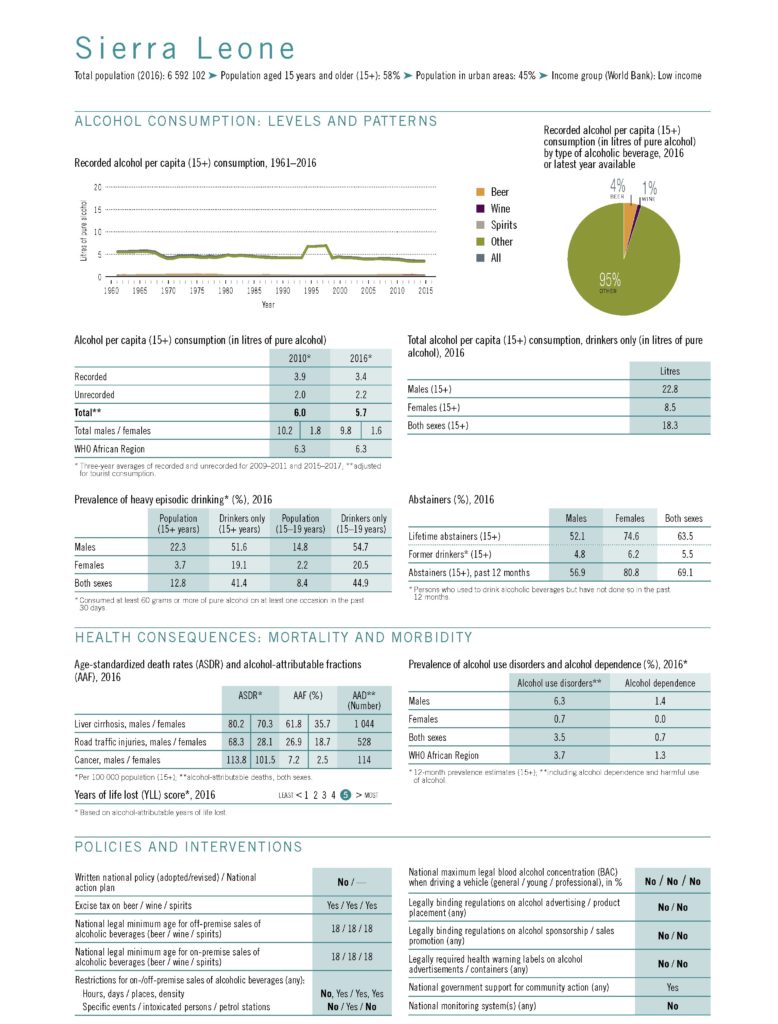Alcohol policy solutions have great potential in protecting people from harm caused by the products and practices of the alcohol industry. The alcohol policy ‘best buys’ are powerful tools for boosting development in low- and middle-income countries. One country to try and unlock the potential of alcohol policy solutions is Sierra Leone.
The West African country started the process to develop an alcohol policy with a regional consultative meeting held in the districts of Bombali and Port Loko on August 17 and 18, 2021. Government and non-governmental participants attended the meeting, including officials of the Ministry of Health and Sanitation, the Ministry of Social Welfare, the security sector, as well as district and city councils, paramount chiefs and civil society leaders.
They discussed the following alcohol policy solutions in the meeting:
- The improvement of alcohol availability rules,
- Raising alcohol taxation,
- Alcohol-impaired driving counter measures,
- Alcohol advertising and promotions and sponsorship, and
- Community action for reducing harm caused by alcohol.
The discussed measures include the WHO’s Best Buy alcohol policies and measures recommended through the SAFER initiative.
Officials of the Ministry of Health and Sanitation through the Directorate of Non-Communicable Diseases and Mental Health established the Alcohol Control Technical Working Group (ACTWG) in May 2019. The working group will lead the development of the new alcohol policy and the strategic plan in the country. The regional engagements are ongoing and will continue in Kenema, Bo and Western Area.
Sierra Leone currently has several laws regarding alcohol control. These are:
- Liquor Act (1924),
- Palm Wine Act (1927),
- Liquor Licensing Act (1960),
- Public Order Act (1965), and
- Road Traffic Act (2007).
However, according to officials these laws are scattered, outdated and provide insufficient regulations in comparison to the modern alcohol policy solutions that are available and that should be combined in one alcohol act and policy. The new policy is envisioned as a comprehensive legal framework to prevent and reduce alcohol harm aligned with the WHO Global Alcohol Strategy.
Alcohol policy in Sierra Leone: A timely solution
Despite over three quarters of the people of Sierra Leone living alcohol-free, alcohol harm is high in the country. This is due to the heavy consumption among those who do use alcohol. Alcohol per capita consumption among men who use alcohol is 22.8 liters. Over one third (41.4%) of those who use alcohol above 15 years of age engage in binge alcohol consumption. Sierra Leone is placed in the highest end for years of life lost due to alcohol.
The alcohol industry is exploiting the weak alcohol regulations to maximize profits by targeting the growing middle-income and youth populations. Big Alcohol aggressively markets their products and increases availability of cheap alcohol to drive higher sales. Considering the heavy alcohol burden in Sierra Leone and Big Alcohol strategies in the African region, it is timely to introduce a comprehensive alcohol policy in the country.
The alcohol policy will serve as a wakeup call for effective action in reducing harm from alcohol,” said Dr. Mamoud Idriss Kamara, the Chief Medical Officer, as per Politico SL.
Dr. Mamoud Idriss Kamara, Chief Medical Officer
